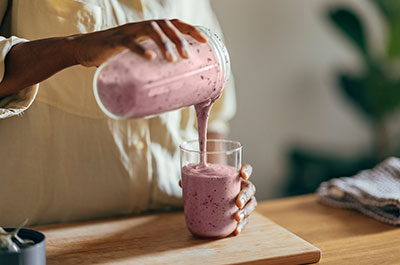Many of us have spent years counting calories, avoiding eggs and eating low-fat to lose weight. But a lot of the old nutrition advice is inaccurate or incomplete, says Allegra Picano, RDN, a dietitian at Henry Ford Health.
“While some past nutrition tips may achieve short-term weight loss, they aren’t sustainable. Other nutrition rules have been disproven as we’ve better understood how different foods support our health.”
She explains 10 myths about weight loss and diet and what you need to know.
Myth 1: You Must Count Calories
You do need to eat fewer calories than you burn to lose weight. “But food provides much more than calories. It’s nutrition and fuel. An avocado that contains 200 calories of healthy fats and fiber is better than the same calories from a bag of chips.
Your calorie needs vary depending on age, activity level and overall health. Some days, you may need to eat more to support increased physical activity or to help you recover from an illness. Plan your daily diet to meet your current nutritional needs.
Myth 2: Drink 8 Glasses Of Water Daily
This statement isn’t necessarily a myth but it’s also not an absolute rule. Your hydration needs vary depending on age, health, environment and activity. “Follow your body’s thirst cues to stay hydrated. If you’re drinking so much water that your urine is clear, you’re drinking too much,” says Picano.
She also suggests planning hydration. If you’re spending time in the sun, drink water to help you stay cool and avoid heat stroke.
Myth 3: Eat Low-Fat Foods
Eating low-fat foods can actually cause you to gain weight, Picano says. “Many reduced-fat products contain added sugar to make up for flavor lost with less fat. People tend to feel less satisfied, eat larger portions and gain weight.”
Our bodies need fat to make hormones, insulate our organs, and fuel our brain and heart. The key is to limit foods high in saturated fat, such as fried foods or red meat. Choose smaller portions of healthy fats—olive oil, avocados, nuts and seeds.
Myth 4: Breakfast Is The Most Important Meal Of The Day
For some people, eating breakfast reduces the chance of overeating later in the day. Others aren’t hungry first thing in the morning.
“Either schedule can work to support a healthy weight. The key is to avoid becoming over-hungry, which can cause you to reach for high-calorie foods to satisfy your hunger,” says Picano.

Myth 5: Nutrients From Vitamins Are the Same As Nutrients From Food
There’s no research to show whether we absorb the same amount of vitamins from supplements as we do from food. Whole foods also offer fiber, protein and complex carbohydrates that fuel our bodies.
“You can think of multivitamins as an insurance policy. If you’re missing some nutrients, a multivitamin may be helpful, but it’s not a replacement for nutritious foods,” says Picano.
Myth 6: Eating Eggs Increases Cholesterol
In the past, eggs were linked with an increased risk of high cholesterol and heart disease. It’s now widely accepted that the cholesterol found in food does not impact the cholesterol in our bodies, explains Picano.
“Eggs are a great source of vitamins, protein and healthy fats. You can safely enjoy two per day,” she says. “If you prefer using an egg substitute, choose a product that doesn’t contain added sugar or other fillers.”
Myth 7: Caffeine Is Bad For You
You may have heard statements like, “Coffee will stunt your growth.” However, recent studies suggest caffeine lowers your risk for type 2 diabetes, heart disease, certain cancers, Parkinson’s disease and depression.
The key is portion size. One cup of brewed coffee contains between 70 and 140 milligrams of caffeine. Most people can safely drink up to 400 milligrams per day. “If you’re trying to lose weight, avoid adding extra calories with sweetened creamers or syrups,” says Picano. “Try skipping the whipped cream and flavoring coffee with cinnamon or cocoa instead.”
Myth 8: Smoothies And Fruit Juices Are Good For You
You eliminate fiber when you process fruit to make a smoothie or juice. While you still get nutrients from your fruity drink, you miss out on fiber’s benefits, including feeling full longer. It also helps regulate blood sugar and keeps your digestive system on track.
“You can boost the nutrients in juice or smoothies by adding vegetables. However, avoid using these beverages as a meal replacement. You’ll feel more satisfied and get more nutrition by enjoying a meal with fruits and vegetables,” says Picano.
Myth 9: Margarine Is Better Than Butter
Many margarines use palm or corn oils, which are higher in saturated fats and can increase your risk of heart disease over time. In addition, many margarine products are highly processed, with added flavorings and salt.
“While butter contains some fat, it’s not highly processed, making it a healthier option in small portions,” says Picano. “If you prefer margarine, choose products made with canola oil.”
Myth 10: Follow A Low-Carb Diet
Low-carb diets like the keto diet are popular for weight loss. While they tend to be effective for a while, these diets are challenging to follow forever.
“Complex carbohydrates provide energy to fuel our bodies throughout the day,” Picano notes. “Make healthy swaps in your diet by eating whole-grain bread, pasta and brown rice rather than products made with refined white flour. Other healthy carbs include potatoes, peas, squash and fruit,” she says.
Stick With Nutrition Basics
Picano advises sticking with nutrition basics to lose weight. Focus on eating a variety of fruits, vegetables, lean proteins, whole grains and healthy fats.
“This well-balanced diet, regular exercise, and good sleep habits can help you achieve and maintain a healthy weight and lifestyle,” she says.
Reviewed by Allegra Picano, a registered dietitian nutritionist at Henry Ford Health.



